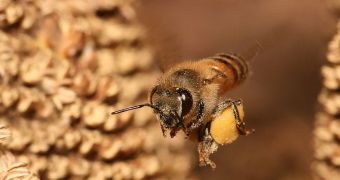A group of investigators has determined that honeybees may be the first invertebrate creatures to display signs of pessimism. This emotion was until now believed to be limited to more complex animals, but that turns out not to be the case.
Discovering this benchmark cognitive trait in insects is a major breakthrough in the field of biology, researchers explain. Until now, only mammals such as dogs, horses or humans were known to be able to display this emotion.
The fact that insects have feelings too is mind-boggling, researchers say. The new work was led by scientists Melissa Bateson and Jeri Wright, who are both based at the Newcastle University, in the UK.
The response honeybees exhibit to certain stimuli “has more in common with that of vertebrates than previously thought,” the two investigators explain. Details of their work appear in the June 2 issue of the scientific journal Current Biology.
What the new discoveries “suggest [is] that honeybees could be regarded as exhibiting emotions,” the team explains further. Their proposal is bound to elicit significant controversies in the international scientific community, Wired reports.
“Invertebrates like bees aren’t typically thought of as having human-like emotions,” Bateson says, adding however that insects and more complex creatures share multiple neurological connections.
“Way, way back, we share a common ancestor. The basic physiology of the brain has been retained over evolutionary time. There are basic similarities,” the investigators argues.
While some scientists have already opposed the findings, others have taken a good look at the study methodology, and determined that it is sound. This is also the opinion of Emory University evolutionary neurobiologist Lori Marino.
“I don’t think it’s a stretch to say that they are tapping into bee emotions. After all, every animal has to have emotions in order to learn and to make decisions. And we already know from many other studies that bees are really cognitively sophisticated,” she explains.
Bateson adds that upcoming investigations will be focused on determining whether honeybees can also display happiness and other emotions. At the same time, the team will check to see if pesticides and other chemicals the bees are subjected to play any role in influencing their behaviors.

 14 DAY TRIAL //
14 DAY TRIAL //